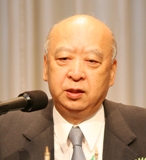��Future Prospects of the Political Situation��
June 3, 2009
Mr. Katsuji Ebisawa
President,
Okuma Memorial Education Foundation
 ��In the world of politics, nobody can tell what may happen next. In such a turbulent period we are facing today, political discussions based on predictions, stereotypes, fixed ideas, or wishful thinking will result in mistakes. This is why politicians deliberate on a variety of measures, considering the widest possible scenarios.
��In the world of politics, nobody can tell what may happen next. In such a turbulent period we are facing today, political discussions based on predictions, stereotypes, fixed ideas, or wishful thinking will result in mistakes. This is why politicians deliberate on a variety of measures, considering the widest possible scenarios.
��Assessment of the political situation must be based on the scrutiny and reference to the past history, as it is said that ��one cannot understand politics without knowing history.��
��Political situation after the start of Aso��s cabinet in September 2008 always focused on the timing of a snap General Election and lacked a long-term perspective and serious discussions on the national goals or future directions to be taken in this critical time affected by worldwide recession. The Diet approved the supplementary budget worth 14 trillion yen, and related bills are being discussed, while the term for the House of Representatives will end on 10th September.
��It is the Prime Minister��s exclusive prerogative to dissolve the House of Representatives. Looking back on the history of General Elections since the Meiji era, almost all elections have been conducted in order to maintain and strengthen the political power. Therefore, the timing is determined by the perceived advantages and disadvantages for the ruling party. Prime Minister Aso has been groping for the timing of dissolution, and the General Election is likely to take place sometime between 2nd August and 6th September.
��Public opinions are shifting rapidly today, making prediction even harder in the current single-seat constituency system. Various opinion polls are conducted frequently by the press via telephone and internet, and they give enormous impact on the formation of public opinions. Opinions by commentators and celebrities on TV gossip shows also affect the attitude of voters. In this context, politicians tend to concentrate on eye-catching performance, catchphrases or slogans, avoiding serious discussions on one��s policies or creed.
��A symbolic incident that proves the fatal impact of political scandals occurred in March, when the chief public secretary of Ichiro Ozawa, President of the Democratic Party of Japan (DPJ), was arrested for violating the Public Funding Regulation Law. This happened when a favorable mood was rising towards the DPJ to replace the long-standing rule of the Liberal Democratic Party (LDP). As a result, the DPJ President Ozawa had no choice but to resign, and the newly-elected party President Yukio Hatoyama will lead the forthcoming election campaign.
��LDP lost the General Election in 1993, and ever since, Mr. Ichiro Ozawa has played a pivotal role in the political situation for 16 years. This power structure is likely to remain for some time.
��In 1955, the Liberal Party and the Democratic Party merged into a conservative coalition government and became the LDP.
��The present DPJ was founded in September 1996, when Mr. Hatoyama left the Takeshita faction of LDP and joined hands with the reformist Mr. Kan. In September 2003, it merged with the Liberal Party led by Mr. Ozawa and secured a position as the dominant opposition party. DPJ currently holds 112 seats in the 480-member House of Representatives. If DPJ wins 241 seats it will have a majority and Hatoyama��s cabinet will become a reality. However, considering the present situation, it seems to be virtually impossible. Therefore, DPJ needs to win 220-230 seats to make a coalition with the Social Democratic Party or People��s New Party. If LDP fails to obtain a majority, coalition with the New Komeito Party is likely to continue. Forecasting the outcome of the forthcoming election is highly complex and complicated, as the results in only a handful of seats could possibly change the government.
��The existence of a credible opposition party is a prerequisite for democracy. Ways to form small- or middle-scale coalitions will be sought, which is not an easy task and might result in an unstable political situation for the next 10 years or so.
��Leaders with strong personality are absent in the Japanese political arena today. Kakuei Tanaka, who rose to power from nowhere, left a famous saying ��Politics is power. Power is number. Number is money�� describing his political creed. He believed that one can achieve the ruling power by controlling just one-third of people in a certain organization. This was because, by and large, one-third of people remain uncommitted and silent. All you have to do is control half of the remaining two-thirds, i.e. one-third of the total.
��Ichiro Ozawa, who won his first election at the age of 27, learned under Tanaka, making his political style similar to that of Tanaka or Kanemaru. Ozawa and Tanaka were both superb politicians with excellent intuition and an ability to win the hearts of the people. However, Mr. Tanaka was openhearted and tried not to make any enemies but Mr. Ozawa��s more reserved nature makes him appear more autocratic and less consensual.
��
��Mr. Ozawa has always preferred to keep a low profile giving political influence, guidance and instructions on personnel management and financial affairs from behind the scenes. As he resigned as the party President, the coming election will be an ideal opportunity for him to exert his political skills to corner and outmanoeuvre the LDP.
��An Election is said to be a ��festival of democracy.�� I hope the forthcoming election will enliven political discussions so that many competent politicians will be elected.